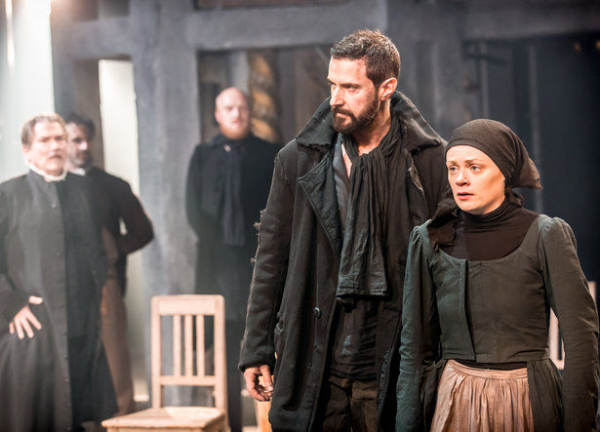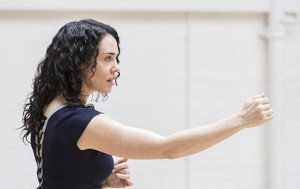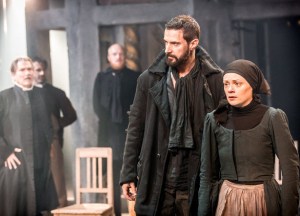
© Johan Persson
Since the last London production of The Crucible, Arthur Miller's searing indictment of the witch hunt mentality posing as moral righteousness, we've had plenty of local examples of this recurring human phenomenon, proving the strength of Miller's allegorical drama written at the height of the "reds under the bed" scare in America.
The Crucible, one of the key social plays of the last century, is ostensibly about the trials and convictions in Salem, Massachusetts, in 1692. A community is knocked sideways by rumours of girls dancing naked in the woods, murdered babies, "enemies in the dark," and even puppets stuffed with needles, one of which is produced as evidence in court.
In the new in-the-round configuration at the Old Vic, Yaël Farber's strident and mostly gripping production starts slowly and ritualistically, with the Barbadian slave Tituba (Sarah Niles) carrying a smoking bowl while the new reverend's daughter lies in a trance on her bed.
The girls, led by the devious and scheming Abigail Williams (Samantha Colley), are a crypto-coven of sullen adolescents, swishing their long hair in fake ecstasy like a mini-Pina Bausch troupe, trapped in a baseless hysteria fuelled by a few black magic parties.
So far so frightening. Abigail's got her teeth into the honest farmer John Proctor, played with gallant good looks and some physical power by Richard Armitage. A moment of historic weakness allows her to exploit John's adultery to frame Elizabeth (a strikingly stoical Anna Madeley).
The magnificent second act where this situation develops like a canker against a backdrop of rising hysteria, knocks on the door and news of arrests, focuses on the Proctors at their kitchen table, an intimate study of the distance between them.
"You have a faulty understanding of young girls," says Elizabeth. John, who moves towards his own salvation by acknowledging his failures as a man, has to explain why he doesn't go to church; he doesn't like the new priest Paris (Michael Thomas) who's replaced the old pewter candles with gold ones; and he sometimes ploughs a field on a Sunday, another nail in his coffin. "Is the accuser always holy now?"
Armitage and Madeley play this scene beautifully, and Tim Lutkin's lighting sculpts it in startling silhouette. But Armitage's hoarseness – he strains against his own vocal chords – becomes increasingly monotonous as the noose tightens, and the Deputy Governor Danforth, whom Jack Ellis presents as a pantomime villain in jackboots and melodramatic gestures, starts turning up the volume to the extent of blotting out his own arguments.
Soon, everyone's shouting their heads off as if their lives depended on it; this proves a poor way of counter-balancing the rigid, almost hierarchical staging of the comings and goings through the circular arena, where some artful scene changes in Soutra Gilmour's design slow down the evening (well over three-and-a-half hours long) even more.
The act of self-sacrifice in the Salem prison is more temperately done – until we get to the signature scene which suddenly flares and becomes unwatchable – with Adrian Schiller's transformed John Hale, draped in sack-cloth and ashes, and Ann Firbank's wise and tiny Rebecca Nurse (the alleged baby-killer) shining on the side-lines. It's a very strong evening, especially in the tragic renewal of the Proctors' marriage. But a lot of the noise is too hollow to hurt, too blustery to burn.














